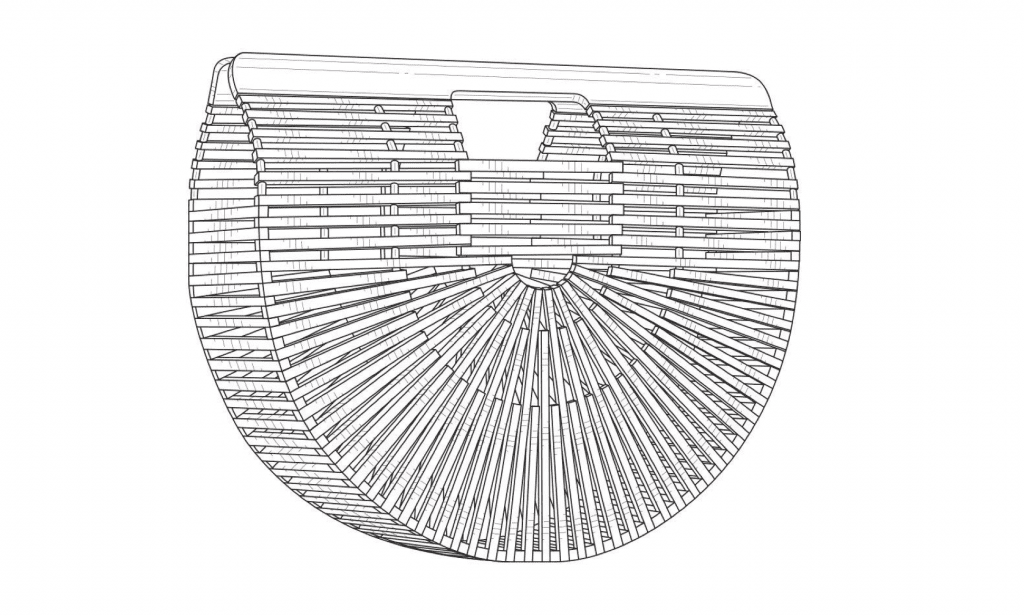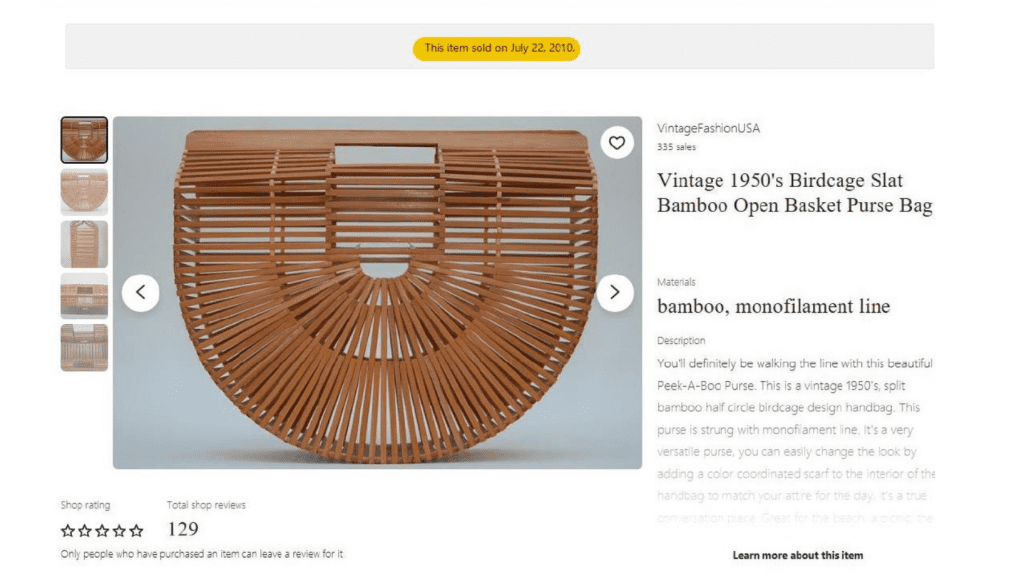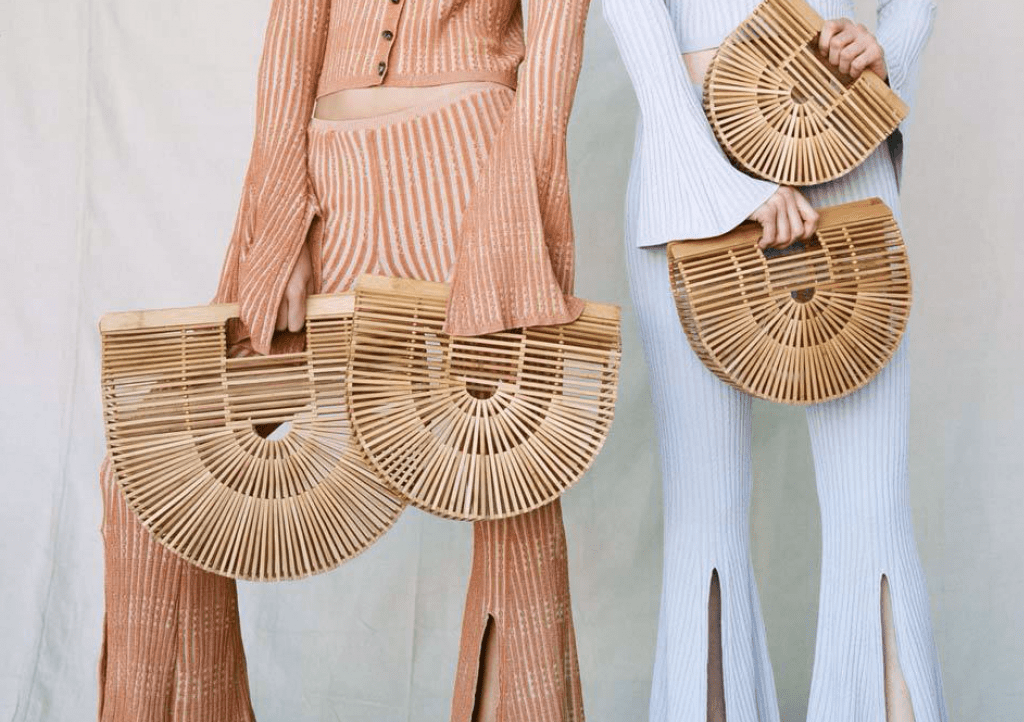Following years of back-and-forth centering on the protectability of the configuration of Cult Gaia’s Ark bag as a trademark, the brand’s corporate entity Jasmin Larian, LLC has been handed a loss by the U.S. Patent and Trademark Office (“USPTO”)’s Trademark Trial and Appeal Board (“TTAB”). In a recently-released decision, a panel of trademark judges for the TTAB affirmed a USPTO examining attorney’s determination that the design of the Instagram-infiltrating Ark bag is generic, and held that “even assuming that the mark is not generic but is instead a nondistinctive product design, we find Jasmin Larian, LLC has failed to make the necessary showing that the proposed mark has acquired distinctiveness.”
Setting the stage in the decision dated January 19, TTAB Judge Allard stated that the Ark bag trademark – which Cult Gaia began selling in January 2013 – consists of the configuration of a 3-D handbag, which bears features including: “(1) a structured and flat front and back panels made of thin, uniformly-sized strips of rigid material; (2) arranged in an interlocking manner to form three concentric half circles creating a distinctive see-through sunburst design; (3) topped by horizontal strips and a handle made of the same material with a curved tapering cutaway; (4) a curved side panel made of interlocking pieces of the same material and in the same width as the pieces that make up the front and back panels; and (5) spacers in the form of circular beads that connect the handle pieces.”
While the TTAB acknowledged that the “Ark bag may be commercially successful,” with Cult Gaia founder Jasmin Larian revealing that total gross sales for the bag “spiked from over $308,000 in 2016 to over $5 million in 2017,” the issue before the trademark appeals board is “whether the bag embodying the proposed mark is generic, (i.e., a common handbag design) or, alternatively, if it is a nondistinctive product design that has [acquired the necessary] distinctiveness” to function as a trademark and be registered with the USPTO. (It is well-established that a product design cannot inherently serve as a trademark by itself, and thus, can be registered as a trademark only upon a showing of acquired distinctiveness.)
A Generic Mark
Looking first at the issue of genericism, the TTAB stated that “in the context of product design, genericness may be found where the design is so common in the industry that it cannot be said to identify a particular source,” noting that “courts exercise particular caution when extending protection to product designs because such claims present an acute risk of stifling competition.” And that is more or less what is at play here, according to the panel of judges, based on relevant evidence, such as the existence of “identical or nearly identical bags” sold by third-parties on sites like Etsy immediately prior to the Ark bag’s launch; evidence of the “historical nature of the design;” and “articles by persons with substantial experience in the fashion industry who confirm that the design is a known design and that it originates from multiple sources,” among other things.

According to the TTAB, the record shows that “in the decades leading up to and the years immediately preceding” the release of the Ark bag by Cult Gaia – and “even concurrently with [its] use, consumers in the U.S. have been exposed to handbags embodying the proposed mark and emanating from multiple third parties.”
Moreover, the panel determined that statements from Ms. Larian “acknowledg[ing] that the bag … is a reproduction of a common bamboo handbag design;” a product insert card that was included with the Ark bags for a certain period of time that stated that ‘This Cult Gaia bamboo handbag is a reproduction of a classic Japanese picnic bag;'” archived pages of Cult Gaia’s website that describe the bag as a reproduction of a Japanese bag; and a YouTube review that included “several persons commenting that the bag design has been known for decades” are “quite probative on the issue of genericness.”
Reflecting on pushback from Jasmin Larian, LLC, including that “random third-party anonymous comments, or statements by sellers on various ecommerce platforms” do not constitute “competent evidence” when it comes to gauging whether a mark is generic. The TTAB held otherwise, stating that such assertions are “unpersuasive,” and noting that Jasmin Larian, LLC “relies on anonymous consumer comments in support of its position on the issue of acquired distinctiveness, [making] it only fair that the USPTO Examining Attorney should similarly be able to rely on anonymous consumer comments in support of the USPTO’s arguments on the issue of genericness.”
Still yet, the TTAB determined that “while novelty is not a requirement [for trademark protection], it is required that the applied-for-mark function as an indicator of source.”
With this in mind and given that “the evidence of record establishes that the applied-for design is a common handbag design” that dates back to at least 1970s, the TTAB held that “handbags embodying the proposed mark are so common in the industry that [the] design is not capable of indicating source and that [Jasmin Larian, LLC’s] proposed mark is at best a minor variation” of an existing design. This makes it so that “the proposed mark is generic,” according to the TTAB, and thus, it is absolutely barred from registration on either the Principal or Supplemental Register.
Acquired Distinctiveness
With genericism out of the way, the TTAB turned its attention to Jasmin Larian, LLC’s claim that even if the mark is generic, it has acquired distinctiveness, and thus, is capable of indicating a single source in the minds of consumers (i.e., acting as a trademark).
In order to prevail on such a claim, an applicant like Jasmin Larian, LLC must show that “the primary significance of the product configuration in the minds of consumers is not the product by the source of that product,” which can be established by showing an “association with a particular source by actual purchasers; length, degree, and exclusivity of use; amount and manner of advertising; amount of sales and number of customers; intentional copying, and unsolicited media coverage of the product embodying the mark.”
Affirming the USPTO’s determination, the TTAB noted that Jasmin Larian, LLC did not present survey evidence to show that consumers associate the Ark bag mark with a single source. The panel also held that while Cult Gaia has sold the bag since January 2013, such length of use is not necessarily conclusive or persuasive because such use was not “substantially exclusive” in light of the fact that “multiple third-parties offered an identical or nearly identical handbag for sale both before [Cult Gaia’s launch] and also concurrently” with its sale of the Ark bag.
On the marketing front, the TTAB notes that Jasmin Larian, LLC engages in an array of marketing of the Ark bag, including paid and unpaid social media marketing and gifting the bag to celebrities. According to Larian, Cult Gaia spent $31,872 on advertising in 2016 and $157,079 in 2017, but that none of that ad spend included “look for” advertising, i.e., ads that “call a consumer’s attention to the sunburst-styled, arc-shaped, bamboo design as a source-indicator.”

In terms of sales, Jasmin Larian, LLC revealed that it between 2014 and 2019, it sold approximately 122,855 Ark bags, resulting in total sales in excess $12.7 million. The TTAB states that the evidence shows that “sales during this time period were highest in 2018, where gross sales revenues exceeded $5.7 million, but dropped in 2019 to $1.5 million.” Despite such figures, the TTAB held that Jasmin Larian, LLC does not provide “any evidence regarding the number of its actual consumers … or overall market content,” or “how the Ark bag ranks in terms of sales in the trade,” making it so that the Board could not “accurately gauge [the company’s] level of success.”
The TTAB stated that its “precedents have long alerted practitioners to the fact that the absence of evidence of competitive contextual information” may limit the probative value of advertising and sales numbers in terms of acquired distinctiveness, and moreover, “a high volume of sales does not always equate to a finding of acquired distinctiveness,” especially in cases where the marks consist of product designs.”
As for attempts by third parties to copy the Ark bag mark, the TTAB noted that Jasmin Larian, LLC asserts that it has been successful in policing its mark by sending cease-and-desist letters to parties that use the mark without its authorization, but since Jasmin Larian, LLC did not provide “any evidence” about such alleged enforcement efforts, such as copies of such letters, responses, or settlement agreements, the TTAB found that it could not draw “meaningful conclusions.”
Finally, when it comes to unsolicited media attention, the TTAB acknowledged that many big-name celebrities, such as Beyoncé, and influencers have been photographed with the bag, and articles about the bag have been included in publications like the New York Times. While this “favorable unsolicited media attention weighs in [Jasmin Larian, LLC’s] favor,” it is “insufficient to overcome the evidence of record in connection with other factors, which on balance weight against” the company.
Overall, the evidence “does not support a finding that consumers perceive the design of [the Ark bag] as an indicator of source,” and thus, the TTAB determined that Jasmin Larian, LLC has “failed to establish that the bag bad design embodying the proposed mark has acquired distinctiveness,” thereby, refusing to register the Ark bag trademark on both genericness and acquired distinctiveness grounds.
Not an exceptional outcome, the case proves to be the latest example of the difficulty that comes with seeking registration for product configurations, such as the Ark bag, largely due to the bar against functionality (i.e., the claimed design is essential to the purpose of the article or affects the cost or quality of the article, or it is competitively necessary to use the feature of the design in the relevant market), and the requirement of acquired distinctiveness for product configurations.
UPDATED (March 29, 2022): The TTAB revealed that it has chosen to redesignate the decision that issued on January 19, 2022 as a precedent.











